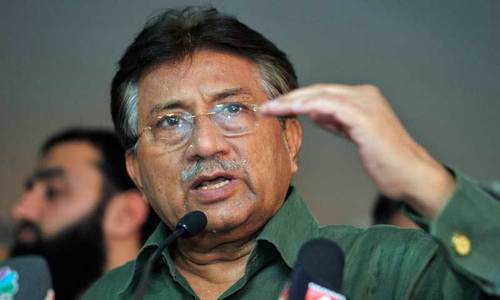ISLAMABAD: A controversial statement of former military ruler Gen Pervez Musharraf echoed in the Supreme Court during the hearing of a case moved by model Ayyan Ali on Thursday. However, Chief Justice-designate Mian Saqib Nisar made it clear that the judiciary did not decide cases due to pressures from various quarters but in accordance with its conscience and the law.
“Let it be known to everybody that the judiciary never decides cases under pressure, but in accordance with its conscience,” observed Justice Nisar while heading a three-judge bench that has taken up the case of Ms Ali, who is seeking permission to go abroad to fulfil her contractual obligations.
Justice Nisar avoided commenting further and said the matter was not before the bench.
He made the observation when the model’s counsel, Sardar Latif Khosa, alluded to Gen Musharraf’s recent statement that the army had “persuaded” the present government to let the former president go abroad.
In an interview to a private television channel, Gen Musharraf had claimed that once former army chief Gen Raheel Sharif had got the government to relieve the pressure they were exerting, the courts gave a judgement and allowed him to go abroad for treatment. But Justice Nisar said the March 16 Supreme Court judgement was not delivered under any pressure.
Headed by Chief Justice Anwar Zaheer Jamali, a five-judge bench had lifted a travel ban imposed on Gen Musharraf by dismissing the federal government’s appeal against the June 12, 2014, order of the Sindh High Court (SHC) about removing the general’s name from the exit control list (ECL).
While lifting the travel ban, the apex court had shifted the entire blame for the decision on the federal government and said the government or the three-member special court seized with the treason trial of Gen Musharraf was free to make any decisions regarding his custody or restricting his movements.
“The former dictator facing treason charges was allowed to go abroad but my client is being dragged [in courts] for the last two years,” Mr Khosa regretted and added that the law and order situation in the country would have been better had the interior ministry spent more energy in weeding out terrorism than in stopping an individual from going abroad.
The Supreme Court, however, ordered the SHC registrar to fix Ms Ali’s pending petition on Jan 9 before a referee judge, who was not part of the division bench that had issued a conflicting decision, with one judge allowing the model to go abroad and the other opposing the same.
Ayyan Ali was arrested on March 14, 2014, at the Benazir Bhutto International Airport, Islamabad, while trying to go abroad — on valid visa, passport and air ticket — but carrying foreign currency worth $506,800 without prior permission of the State Bank of Pakistan and without any lawful excuse about why she was taking the money abroad.
On Dec 19, the model submitted an application to the apex court for an early hearing of her case against the government for not removing her name from the ECL.
Ms Ali contended before the court that she urgently needed to go to the United Arab Emirates to fulfil her contractual obligations about some photo sessions. Therefore, the court should fix the matter urgently, preferably on Dec 22, as a delay would create hardships for her because her name was still on the ECL.
She explained that failing to reach Dubai in time would result in her paying $10 million to the advertising company with which she had signed a modelling contract.
She was under great mental stress, the application said, because a failure to fulfil contractual obligations would also adversely affect her reputation.
Published in Dawn, December 23rd, 2016













































